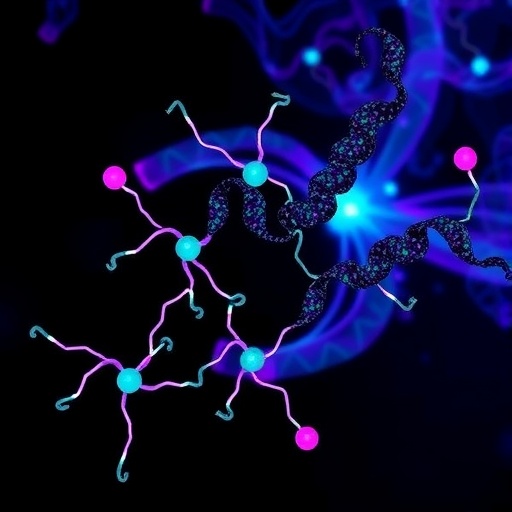
Recent research reveals a significant advancement in the understanding of ovarian cancer and its mechanisms of resistance to chemotherapy. A team led by Zhang et al. has published a groundbreaking study in the Journal of Ovarian Research that brings to light the role of 5-methylcytosine in regulating CCNL2, a protein implicated in tumorigenesis and the chemotherapy resistance typically observed in patients undergoing treatment with cisplatin. Their findings could have vital therapeutic implications for improving the management of ovarian cancer, a disease characterized by poor prognosis and high mortality rates.
Ovarian cancer presents a unique challenge in oncology due to its asymptomatic nature in early stages and the complexity of its biological landscape. The disease often evades early detection, leading to advanced-stage diagnosis and reduced survival chances. Traditional approaches such as surgical interventions and chemotherapy have been met with limited success, particularly because of the development of resistance to drugs like cisplatin, which remains a cornerstone of treatment. Understanding the molecular underpinnings of this resistance is critical for developing innovative therapeutic strategies.
The study conducted by Zhang and colleagues identifies the protein CCNL2 as a key player in the progression of ovarian cancer. CCNL2 is involved in the regulation of the cell cycle and has now been linked to the methylation process that influences gene expression. The researchers utilized a combination of laboratory experiments, including cell culture models and genetic analyses, to explore how 5-methylcytosine, a methylation mark associated with transcriptional regulation, impacts CCNL2 that in turn influences tumorigenesis and cisplatin resistance.
The findings suggest that the expression levels of CCNL2 are altered in ovarian cancer tissues compared to normal tissues, raising questions about its role in cancer cell proliferation and survival. The overexpression of CCNL2 was associated with increased cell viability and proliferation in the presence of cisplatin, indicating that CCNL2 could confer a survival advantage to cancer cells in a chemotherapeutic context. This discovery underscores the importance of epigenetic modifications in cancer biology, presenting methylation as a potential target for new therapeutic strategies.
Furthermore, the study elaborates on how 5-methylcytosine interacts with various transcription factors to regulate CCNL2 expression. The intricate relationship between methylation patterns and gene expression highlights the sophistication of biological regulation within cancer cells. Dissecting such interactions provides a deeper insight into how tumors adapt and survive, particularly under the selective pressures imposed by chemotherapy.
An intriguing aspect of this study is the therapeutic implications of targeting CCNL2 in ovarian cancer treatment. Inhibition of CCNL2 expression or function could sensitize cancer cells to cisplatin, restoring the efficacy of this chemotherapy agent. Researchers are beginning to explore pharmacological strategies that could inhibit CCNL2 or modify the methylation landscape to capitalize on this vulnerability. Such approaches could potentially reshape how clinicians manage ovarian cancer, emphasizing the role of personalized medicine.
In the broader context, this research positions itself within the rapidly expanding field of epigenetics, which seeks to unravel the layers of gene regulation beyond the genetic sequence itself. As scientists continue to elucidate the epigenetic mechanisms at play in various cancers, there lies a promising future for the development of novel interventions that can tackle issues like drug resistance, paving the way for more effective cancer management strategies.
The implications extend beyond ovarian cancer as well. Understanding CCNL2 regulation and its interaction with methylation could yield insights applicable to other malignancies that exhibit similar resistance phenotypes. As researchers synthesize data across various cancer types, the potential for cross-applicability of therapeutic strategies emerges, fostering a more integrated approach to cancer treatment.
In summary, Zhang et al.’s research makes significant strides in delineating the role of 5-methylcytosine-mediated control of CCNL2 in ovarian cancer. Their findings have opened pathways for future investigations into targeted therapies that can disrupt the resistance mechanisms that plague conventional treatments. As the field of epigenetics continues to evolve, the hope is that such research will not only improve survival rates for ovarian cancer patients but also inform treatment paradigms across the oncology spectrum.
Research such as this exemplifies the importance of collaboration and innovation in scientific endeavors. The integrative approach utilized by Zhang and colleagues, combining molecular biology, genetics, and cancer therapeutics, underscores the multifaceted nature of modern biomedical research. As we stand on the cusp of breakthroughs in cancer therapy, it is studies like this that will catalyze change, ultimately leading to improved outcomes for patients worldwide.
As we look forward to the future of cancer research, it is vital to consider the implications of this work in the clinical setting. Oncologists may soon have access to novel biomarkers for predicting cisplatin resistance, which can guide therapeutic decisions more effectively. Furthermore, the focus on personalized treatment plans, informed by the genetic and epigenetic landscape of an individual’s tumor, represents a significant shift in how we understand and combat cancer.
As this area of study develops, ongoing research will play a crucial role in validating the findings of Zhang et al. Subsequent clinical trials aimed at targeting CCNL2 and manipulating its regulatory pathways will be essential to determining the clinical viability of these approaches. Such trials will pave the way for the translation of benchside discoveries to bedside applications, ensuring that innovation in research translates into tangible benefits for patients battling ovarian cancer.
There is no doubt that the intersection of epigenetics and cancer biology will remain a focal point in cancer research. The continuous discovery of molecular mechanisms such as those elucidated by Zhang and colleagues will encourage further exploration into the genetic factors that contribute to cancer’s heterogeneous nature. The evolution of cancer therapy hinges not only on understanding the disease’s biology but also on the actionable insights derived from this understanding.
In conclusion, the study conducted by Zhang et al. opens a promising frontier in ovarian cancer research, illuminating the role of 5-methylcytosine and CCNL2 in tumor biology and drug resistance. Their work serves as a compelling reminder of the dynamic landscape of cancer treatment, where the interplay of genetics and epigenetics can potentially lead to revolutionary advancements in how we approach and ultimately conquer this formidable disease.
Subject of Research: 5-methylcytosine regulated CCNL2 and its role in ovarian cancer tumorigenesis and cisplatin resistance.
Article Title: 5-methylcytosine regulated CCNL2 promotes tumorigenesis and cisplatin resistance of ovarian cancer with therapeutic implications.
Article References:
Zhang, K., Cheng, G., Jiang, W. et al. 5-methylcytosine regulated CCNL2 promotes tumorigenesis and cisplatin resistance of ovarian cancer with therapeutic implications.
J Ovarian Res 18, 162 (2025). https://doi.org/10.1186/s13048-025-01753-9
Image Credits: AI Generated
DOI: 10.1186/s13048-025-01753-9
Keywords: Ovarian cancer, 5-methylcytosine, CCNL2, cisplatin resistance, tumorigenesis, epigenetics, cancer therapy.
Tags: 5-methylcytosine role in ovarian cancerCCNL2 protein and chemotherapy resistancecisplatin resistance mechanismsearly detection challenges in ovarian cancerinnovative therapies for ovarian cancerovarian cancer prognosis and survival ratesovarian cancer treatment advancementsovercoming drug resistance in cancer therapysignificance of molecular research in oncologytherapeutic implications of CCNL2 regulationtumorigenesis in ovarian cancerunderstanding ovarian cancer biology




